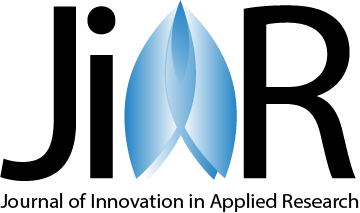
Quantum Computing-Novelty and Research Challenges
10
Views
16
Downloads
The idea of Quantum computer is different from classical computing methodologies. Presently, we work to resolve a problem on digital computers which is based on binary values.Quantum computers work on the qubit which is quantum bits based on quantum entanglement to solve a problem. There exists some algorithm for Quantum computers like Shor's algorithm which is used to find the prime factors of a number. There is D-wave computer which is based on 128 - qubit processor (Rainer).
<?xml version="1.0" encoding="UTF-8" standalone="yes"?>
<!DOCTYPE article PUBLIC "-//NLM//DTD JATS (Z39.96) Journal Publishing DTD v1.2d1 20170631//EN" "JATS-journalpublishing1.dtd">
<article xlink="http://www.w3.org/1999/xlink" dtd-version="1.0" article-type="applied-research" lang="en">
<front>
<journal-meta>
<journal-id journal-id-type="publisher">JIAR</journal-id>
<journal-id journal-id-type="nlm-ta">Journ of innovation in applied research</journal-id>
<journal-title-group>
<journal-title>Journal of Innovation in Applied Research</journal-title>
<abbrev-journal-title abbrev-type="pubmed">Journ of innovation in applied research</abbrev-journal-title>
</journal-title-group>
<issn pub-type="ppub">2231-2196</issn>
<issn pub-type="opub">0975-5241</issn>
<publisher>
<publisher-name>Radiance Research Academy</publisher-name>
</publisher>
</journal-meta>
<article-meta>
<article-id pub-id-type="publisher-id">59</article-id>
<article-id pub-id-type="doi">10.51323/JIAR.1.1.2018.25-28</article-id>
<article-id pub-id-type="doi-url"/>
<article-categories>
<subj-group subj-group-type="heading">
<subject>Applied Research</subject>
</subj-group>
</article-categories>
<title-group>
<article-title>Quantum Computing-Novelty and Research Challenges
</article-title>
</title-group>
<contrib-group>
<contrib contrib-type="author">
<name>
<surname>Vishwakarma</surname>
<given-names>Vijay Kumar</given-names>
</name>
</contrib>
<contrib contrib-type="author">
<name>
<surname>Jena</surname>
<given-names>Soumya Ranjan</given-names>
</name>
</contrib>
</contrib-group>
<pub-date pub-type="ppub">
<day>1</day>
<month>01</month>
<year>1970</year>
</pub-date>
<volume>1</volume>
<issue/>
<fpage>25</fpage>
<lpage>28</lpage>
<permissions>
<license license-type="open-access" href="http://creativecommons.org/licenses/by/4.0/">
<license-p>This is an open-access article distributed under the terms of the Creative Commons Attribution (CC BY 4.0) Licence. You may share and adapt the material, but must give appropriate credit to the source, provide a link to the licence, and indicate if changes were made.</license-p>
</license>
</permissions>
<abstract>
<p>The idea of Quantum computer is different from classical computing methodologies. Presently, we work to resolve a problem on digital computers which is based on binary values.Quantum computers work on the qubit which is quantum bits based on quantum entanglement to solve a problem. There exists some algorithm for Quantum computers like Shor's algorithm which is used to find the prime factors of a number. There is D-wave computer which is based on 128 - qubit processor (Rainer).
</p>
</abstract>
<kwd-group>
<kwd>Quantum computing</kwd>
<kwd>Quantum entanglement</kwd>
<kwd>Quantum annealing</kwd>
<kwd>D-wave</kwd>
<kwd>Qubit</kwd>
<kwd>Testing</kwd>
</kwd-group>
</article-meta>
</front>
</article>
1. C.H Bennett., E. Bernstein, G. Brassard, U. Vazirani, "The Strength and Weaknesses of Quantum Computing". SIAM Journal on Computing, 1997, Vol-26, No-5, pp. 1510–1523.
2. David Deutsch, "Quantum Theory, the Church-Turing Principle and the UniversalQuantum Computer", appeared in Proceedings of the Royal Society of London A400, 1985, pp. 97-117.
3. M. W. Johnson, "Quantum Annealing with Manufactured Spins", Nature, Vol. 473, 194-198, 2011.
4. Max Tillmann, BorivojeDakic, Rene Heilmann, Stefan Nolte, Alexander Szameit, and Philip Walther, “Experimental Boson Sampling”, Cornell University Library, arXiv:1212.2240, DOI: 10.1038/nphoton.2013.102, pp. 1-7.
5. Shu-Shen Li, Gui-Lu Long, Feng-Shan Baii, Song-Lin Feng, and Hou-ZhiZheng, “Quantum Computing”, PNAS, October 9, 2001,vol. 98, Issue no. 21, pp. 11847–11848.
6. SoumyaRanjan Jena, Santosh Kumar Swain, "Chapter-1: Out-set", Theory of Computation & Application", Laxmi Publications Pvt. Ltd (in press).
7. Umesh Vazirani, “On the Power of Quantum Computation”, The Royal Society, 1998, pp. 1759-1768.
Department of Computer Science and Engineering, AKS University, Satna- 485001 (M.P); MIET, Bhubaneswar, Odisha (India)